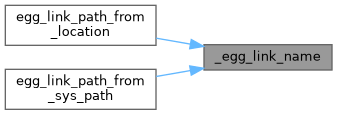Loading...
Searching...
No Matches
pip._internal.utils.egg_link Namespace Reference
Functions | |
| str | _egg_link_name (str raw_name) |
| Optional[str] | egg_link_path_from_sys_path (str raw_name) |
| Optional[str] | egg_link_path_from_location (str raw_name) |
Function Documentation
◆ _egg_link_name()
|
protected |
Convert a Name metadata value to a .egg-link name, by applying the same substitution as pkg_resources's safe_name function. Note: we cannot use canonicalize_name because it has a different logic.
Definition at line 18 of file egg_link.py.
18def _egg_link_name(raw_name: str) -> str:
19 """
20 Convert a Name metadata value to a .egg-link name, by applying
21 the same substitution as pkg_resources's safe_name function.
22 Note: we cannot use canonicalize_name because it has a different logic.
23 """
25
26
References i.
Referenced by pip._internal.utils.egg_link.egg_link_path_from_location(), and pip._internal.utils.egg_link.egg_link_path_from_sys_path().
Here is the caller graph for this function:

◆ egg_link_path_from_location()
| Optional[str] egg_link_path_from_location | ( | str | raw_name | ) |
Return the path for the .egg-link file if it exists, otherwise, None. There's 3 scenarios: 1) not in a virtualenv try to find in site.USER_SITE, then site_packages 2) in a no-global virtualenv try to find in site_packages 3) in a yes-global virtualenv try to find in site_packages, then site.USER_SITE (don't look in global location) For #1 and #3, there could be odd cases, where there's an egg-link in 2 locations. This method will just return the first one found.
Definition at line 39 of file egg_link.py.
39def egg_link_path_from_location(raw_name: str) -> Optional[str]:
40 """
41 Return the path for the .egg-link file if it exists, otherwise, None.
42
43 There's 3 scenarios:
44 1) not in a virtualenv
45 try to find in site.USER_SITE, then site_packages
46 2) in a no-global virtualenv
47 try to find in site_packages
48 3) in a yes-global virtualenv
49 try to find in site_packages, then site.USER_SITE
50 (don't look in global location)
51
52 For #1 and #3, there could be odd cases, where there's an egg-link in 2
53 locations.
54
55 This method will just return the first one found.
56 """
57 sites: List[str] = []
58 if running_under_virtualenv():
59 sites.append(site_packages)
60 if not virtualenv_no_global() and user_site:
61 sites.append(user_site)
62 else:
63 if user_site:
64 sites.append(user_site)
65 sites.append(site_packages)
66
67 egg_link_name = _egg_link_name(raw_name)
68 for site in sites:
69 egglink = os.path.join(site, egg_link_name)
71 return egglink
72 return None
References pip._internal.utils.egg_link._egg_link_name(), and i.
Here is the call graph for this function:

◆ egg_link_path_from_sys_path()
| Optional[str] egg_link_path_from_sys_path | ( | str | raw_name | ) |
Look for a .egg-link file for project name, by walking sys.path.
Definition at line 27 of file egg_link.py.
27def egg_link_path_from_sys_path(raw_name: str) -> Optional[str]:
28 """
29 Look for a .egg-link file for project name, by walking sys.path.
30 """
31 egg_link_name = _egg_link_name(raw_name)
33 egg_link = os.path.join(path_item, egg_link_name)
35 return egg_link
36 return None
37
38
References pip._internal.utils.egg_link._egg_link_name(), and i.
Here is the call graph for this function:
